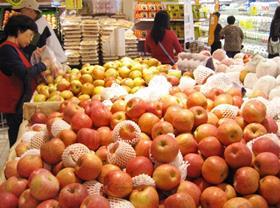
Taiwan has temporarily halved the tariff on three imported fruit lines in an effort to stabilise prices for consumers and increase activity in the country’s wholesale sector.
Vice Premier Jiang Yi-huah announced the reduction in import tariffs yesterday, cutting the fees from 20 to 10 per cent for apples, kiwifruit and nectarines. The cuts will take effect from 6 October, and will last for two months, reported the China Post.
Local supplies are struggling to meet the market’s demand in the aftermath of the typhoons that have hit Taiwan’s production over the course of the year.
Produce wholesale movement in September was the lowest it had been in five years at 15,675 tonnes, according to Council of Agriculture (COA) figures, and the month’s average wholesale price per kg of NT$47.2 (US$1.61) was 60 per cent higher than the same period last year.
“The policy is meant to stabilise domestic fruit prices and relieve consumers’ economic burdens, while also taking into account domestic fruit farmers’ rights and interests,” said Jiang.
“The three fruits chosen are not widely produced in Taiwan, so the import of these fruits should not cause a big impact on domestic fruit growers, especially in this season,” added COA head Chen Bao-ji.
The two-month cut in tariffs is expected to be worth NT$115m (US$3.92m), and the government is making sure the savings are passed on to consumers. The tariff cut should reduce retail prices for imported apples by NT$3 (US$0.10) per kg, nectarines by NT$12 (US$0.41) per kg, and kiwifruit by NT$6 (US$0.20) per kg.
‘Reasonable’ retail prices for the products will be announced by the COA, according to local reports, and importers and retailers have agreed to drop their prices in line with the tariff reductions, according to Chen. He stated the government will take action against retailers who do not reduce their prices, in cooperation with the Consumer Protection Commission and the Fair Trade Commission.
A review of the tariff cut’s success will be made at the end of the two month period, according to Jiang. “We will see if adjustments can be made after two months,” he said.



